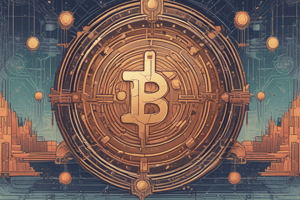Podcast
Questions and Answers
What is the average percentage of sales that pharmaceutical companies allocate to R&D?
What is the average percentage of sales that pharmaceutical companies allocate to R&D?
- 10%
- 20%
- 5%
- 14% (correct)
What term is used to describe drugs that achieve sales of at least $1 billion?
What term is used to describe drugs that achieve sales of at least $1 billion?
- Pattern drugs
- Blockbuster drugs (correct)
- Me-too drugs
- Lifestyle drugs
Which of the following best describes the traditional drug development process?
Which of the following best describes the traditional drug development process?
- Focus on immediate commercialization
- Investment only in successful drugs
- Sequential testing of various compounds (correct)
- Collaboration with numerous generic firms
What is a significant barrier in the pharmaceutical industry related to drug reimbursement?
What is a significant barrier in the pharmaceutical industry related to drug reimbursement?
Which area in pharmaceutical research has attracted the most investment due to its growth potential?
Which area in pharmaceutical research has attracted the most investment due to its growth potential?
Flashcards
High Entry Barriers in Pharma
High Entry Barriers in Pharma
The cost of researching, developing, and launching a new drug can be incredibly high, averaging around $802 million and taking 10-15 years. These significant costs and long timelines act as a major barrier to entry for new companies entering the pharmaceutical industry.
R&D and Patents in Pharma
R&D and Patents in Pharma
Pharmaceutical companies invest heavily in research and development (R&D) to create new drugs and protect their inventions through patents. Around 14% of their revenue is dedicated to R&D, primarily focused on safeguarding their intellectual property and preventing counterfeit products.
Blockbuster Drugs
Blockbuster Drugs
Drugs that achieve blockbuster status (exceeding $1 billion in sales) can have a disruptive impact on the pharmaceutical market. They represent a huge financial success for the companies that develop them, but also create strong competition within the industry.
Uncertainty in Drug Development
Uncertainty in Drug Development
Signup and view all the flashcards
Pharmaceutical Marketing and Sales
Pharmaceutical Marketing and Sales
Signup and view all the flashcards
Study Notes
Technology and Innovation Strategy
- Class participation: 20%
- Hackathon competition: 30%
- Written exam: 50%
What is Technology
- Technology is about creating useful and enjoyable things (production).
- It includes machinery, tools, and knowledge.
- Product technology is embedded in final products/services.
- Process technology mediates between inputs and outputs.
- Technology is both practical (know-how) and theoretical (know-why).
- It's about practical knowledge, skills, and tools used to develop and deliver products and services.
- Technology encompasses a broader field than just Information Technology (IT).
Where Technology Comes From
- Technology sits between science and economics.
- Science provides general rules, while economics focuses on practical application and decision-making.
The Importance of Technology
- Technology is crucial for creating value.
- Entrepreneurs transform inventions into innovation.
- Imitation leads to further inventions and innovation cycles.
- Entrepreneurial activity drives growth for a country.
- Technology is the engine of economic growth.
- Technological advancements, particularly digital technology, have a self-sustaining growth effect.
Pharmaceutical Industry
- The pharmaceutical industry is characterized by fragmentation and consolidation.
- The industry is growth-oriented, driven by increasing life expectancy and incomes.
- Major markets are North America, Europe, and China.
- High entry barriers due to significant R&D costs and patent protection.
- Major players strive to maintain or gain market share.
- Drug development is a long and uncertain process.
- Knowledge and capabilities accumulated in one therapeutic area can be leveraged in other areas.
- Development of new drugs is crucial for the industry's growth.
Video Game Industry
- The video game industry has evolved from arcade games to home consoles.
- Dynastic succession (evolving throughout the years) is a defining characteristic.
- Console features (e.g. graphics, input), price, and timely distribution are very important determinants of success.
- The target market is primarily children and teenagers.
Bookselling Industry
- The US book industry is around $26 billion.
- The market trend is towards giant "superstores."
- Amazon's online model gained popularity due to lower prices and wider accessibility.
Automobile Industry
- The automobile industry has high entry barriers.
- Tesla is a major player in the electric car market.
- Tesla's business model emphasizes direct sales, open innovation, and digital resources.
Photography Industry
- Kodak's success stemmed from its black and white and color film products.
- Kodak failed to adapt to the digital era effectively due to a hesitation to change.
- The rise of digital photography was a major disruption.
- Kodak's diversification initiatives to maintain leadership were unsuccessful.
- Business transformation took too long.
Technology Industry
- Facebook's acquisition of WhatsApp was a significant move.
- WhatsApp's strengths lie in its simplicity, focus, and accessibility.
- The goal for Facebook is to allow users to connect and engage without needing a smartphone.
Toy Industry
- The toy industry features cyclical fluctuations in demand.
- Lego's success is driven by its combination of strong brand recognition and consistency in the production of products.
- Lego's initial success came with its distinctive brick-building system that was hard to copy.
- Lego's failure to adapt led to increased competition creating a need to adapt or change to successfully compete in later years.
Movies Industry
- Disney's movies started off distributing toys as well as the films.
- Disney's culture emphasized creativity and collaboration.
- Disney's acquisition of Pixar was successful due to synergy.
- Maintaining independence for Pixar was important for success.
Diabetes Industry
- Eli Lilly's success was initially based on its insulin (Humulin) which was quickly adopted as a standard.
- Novo Nordisk introduced insulin pens. This is a far more convenient way to administer the drug hence this disrupted the market effectively.
- An effective treatment of diabetes requires a shift in consumer lifestyle and behavior.
- Lilly was late to adopt user-friendly methods of product delivery.
Studying That Suits You
Use AI to generate personalized quizzes and flashcards to suit your learning preferences.
Related Documents
Description
Test your knowledge on the fundamentals of technology and its critical role in innovation. This quiz will cover topics ranging from the definition and origins of technology to its importance in entrepreneurship and value creation. Prepare to explore the intersection of science and economics in the context of technology.




